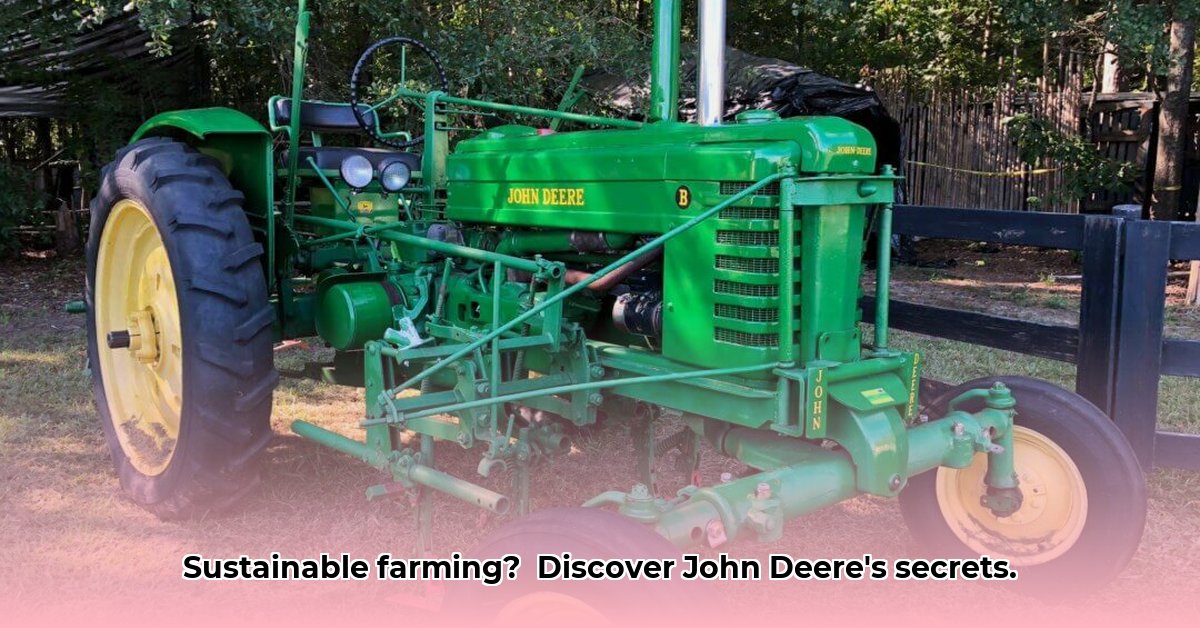
SunSouth Barnesville, a John Deere dealership in Barnesville, Georgia, is more than just a supplier of agricultural equipment; it's a key player in the region's transition towards sustainable farming practices. This case study analyzes SunSouth’s role, highlighting challenges and opportunities in this evolving landscape. For more on John Deere equipment, check out this John Deere X350.
SunSouth's Diverse Offerings: Supporting Sustainable Agriculture
SunSouth's inventory extends beyond the iconic John Deere tractors. They offer a range of equipment, including smaller tools from STIHL and EGO PowerPlus, vital for precision agriculture. This approach aligns with the increasing need for efficient, environmentally conscious farming methods. How effectively does this portfolio support the adoption of sustainable practices within the Barnesville farming community? This is a key question driving our analysis.
Sustainable Agriculture in Barnesville: Trends and Challenges
Sustainable agriculture, characterized by practices minimizing environmental impact while maximizing resource efficiency, is gaining momentum. Precision agriculture, utilizing technology like GPS-guided machinery and data analytics, plays a crucial role. However, a significant challenge in Barnesville, as in many other regions, is the lack of comprehensive data on the adoption rate of sustainable technologies and their associated environmental impact. This lack of concrete data hinders a precise assessment of SunSouth's contribution. Are farmers readily adopting these advancements? What are the primary barriers to wider adoption?
Opportunities for Growth and Advancement
Despite this data deficit, substantial opportunities exist. Conducting thorough market research to understand specific needs of local farmers would allow SunSouth to tailor its offerings and services more effectively. Investing in staff training on the latest sustainable agricultural techniques would better equip their team to advise and support their clientele. Furthermore, leveraging available government subsidies and grants can incentivize farmers to embrace new technologies. How can SunSouth effectively capitalize on these opportunities?
Stakeholder Perspectives: A Collaborative Approach
The transition to sustainable agriculture requires collaboration among various stakeholders. SunSouth's short-term goals should involve strengthening its market research, improving staff training, and accessing available government resources. Long-term, their focus should shift toward becoming a leader in sustainable agricultural solutions within the region. Local farmers need accessible information, training, and cost-effective solutions. Government agencies should continue funding research and promoting policies that encourage sustainable practices. Environmental organizations can contribute through educational initiatives and advocacy.
| Stakeholder | Short-Term Goals (0-1 year) | Long-Term Goals (3-5 years) |
|---|---|---|
| SunSouth Barnesville | Targeted market research; comprehensive staff training on sustainable techniques. | Regional leadership in sustainable ag solutions; expansion of eco-friendly equipment offerings; active data collection. |
| Local Farmers | Evaluation of precision agriculture's cost-effectiveness; exploration of government support. | Full adoption of sustainable practices; demonstrable reduction in environmental footprint; enhanced profitability. |
| Government Agencies | Enhanced funding for sustainable agriculture research and support programs. | Development of policies incentivizing technology adoption and sustainable farming practices. |
| Environmental Organizations | Collaboration with SunSouth on outreach and educational programs. | Advocacy for stricter environmental regulations and improved sustainability metrics; increased public awareness. |
Future Research: Filling the Data Gap
To fully grasp SunSouth's impact, detailed data collection is crucial. Tracking sales figures for specific equipment types, conducting customer surveys to gauge adoption rates and attitudes, and comparing the fuel efficiency and emissions of different equipment, are essential steps. This data-driven approach will provide a comprehensive picture, allowing for a more accurate assessment of the success of sustainable initiatives in Barnesville. What quantifiable metrics can effectively measure the success of these sustainable agricultural practices?
Conclusion: A Path Towards Sustainable Farming
SunSouth Barnesville has the potential to be a driving force in sustainable agriculture within the Barnesville region. However, realizing this potential requires a collaborative effort and a data-driven approach. By investing in market research, staff training, and data collection, SunSouth can not only support local farmers but also contribute to a broader movement towards more environmentally responsible and economically viable agricultural practices. Further research, specifically focused on the economic viability of different sustainable farming methods, would provide valuable insights and inform future strategies.